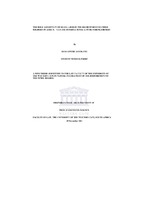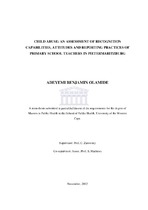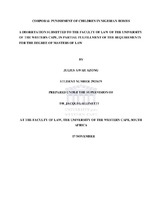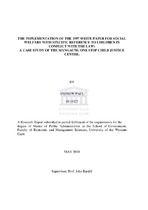The role and effect of small arms in the recruitment of child soldiers in Africa: can the international law be strengthened?
Abstract
It is an unfortunate and cruel reality that both government and armed groups used child soldiers during armed conflict. Child soldiers have become an integral part of government forces as well as insurgent groups in Africa and elsewhere. Most of them are being exploited as combatants, while others perform functions, such as porters, spies who are able to enter small spaces, cooks, messengers, lookouts, and even suicide bombers. Some of the most disturbing aspects of child soldiering are that some of them are being forced to kill or are themselves killed, sexually abused and are exposed to drugs. The use of child soldiers in conflicts is not a recent phenomenon and has indeed become a common practice that characterises modern conflicts. Recruitment is usually carried out forcefully or voluntarily by both government and rebel forces. The difference between these two types of recruitment is not always clear since their decision to join is always influenced by external factors. Examples of such reasons for voluntary recruitment include the desire to revenge, adventure, peer pressure, and need for belonging and survival. Concerning the reason for survival, some argue that, the children do not actually choose freely to become combatants, but are rather forced by circumstances. There are numerous reasons for the continuous targeting of children by armed forces and armed groups. These include shortage of combatants, the fact that children are easy to train physically and psychologically, and also that children are obedient and are readily available. The recruited children are compelled to take part in brutal induction ceremonies, where they are threatened and forced to kill or witness the killing of someone they know.
Collections
Related items
Showing items related by title, author, creator and subject.
-
Child abuse: an assessment of recognition capabilities, attitudes and reporting practices of primary school teachers in Pietermaritzburg
Adeyemi, Benjamin Olamide (2013)Background: Child abuse is a global public health problem with serious consequences for the victims and society. Most studies on child maltreatment in South Africa have focused on the role of teachers as perpetrators and ... -
Corporal punishment of children in Nigerian homes
Azong, Julius Awah (University of the Western Cape, 2011) -
The implementation of the 1997 white paper for social welfare with specific reference to children in conflict with the law: a case study of the mangaung one stop child justice centre
Paul, Andrew (2010)Whilst policy formulation has been extensively studied and theorised in the literature, far less attention has been paid until fairly recently to the issue of policy implementation. For a long time it was more or less ...




